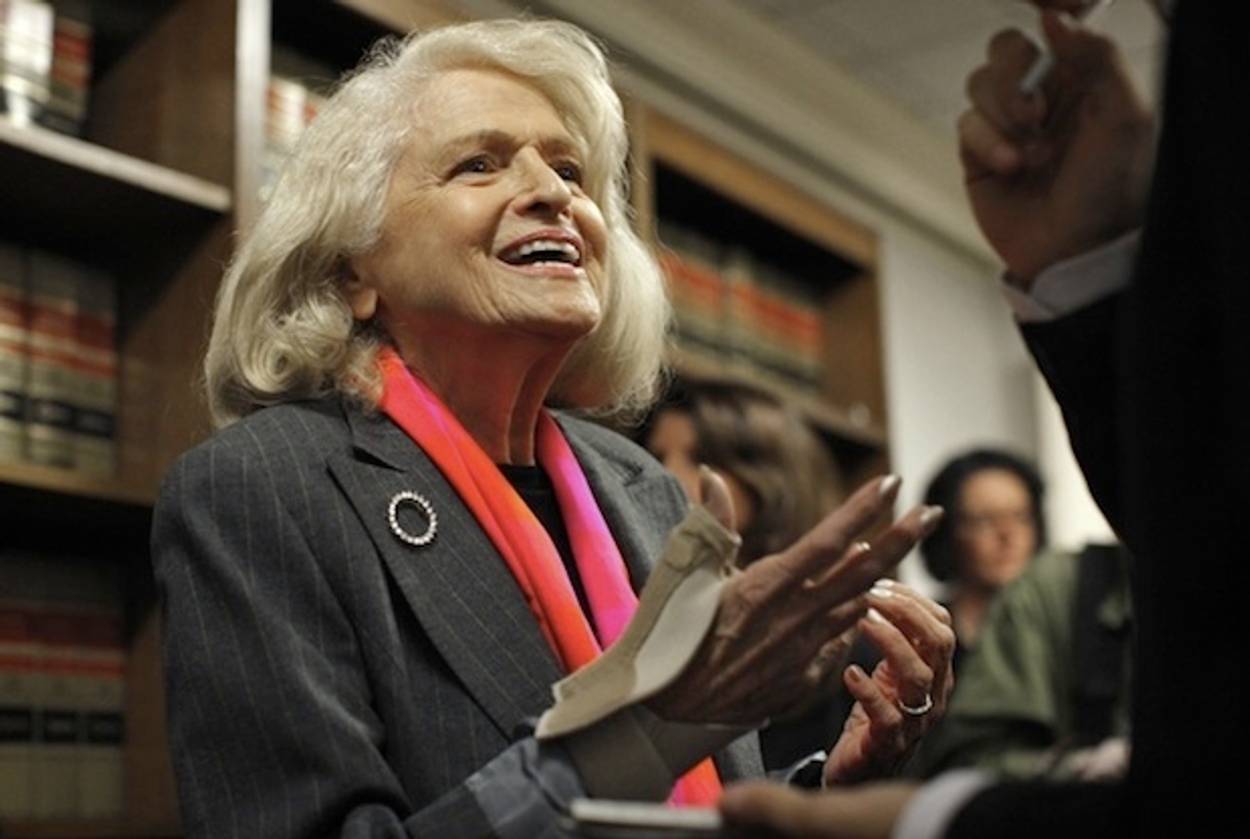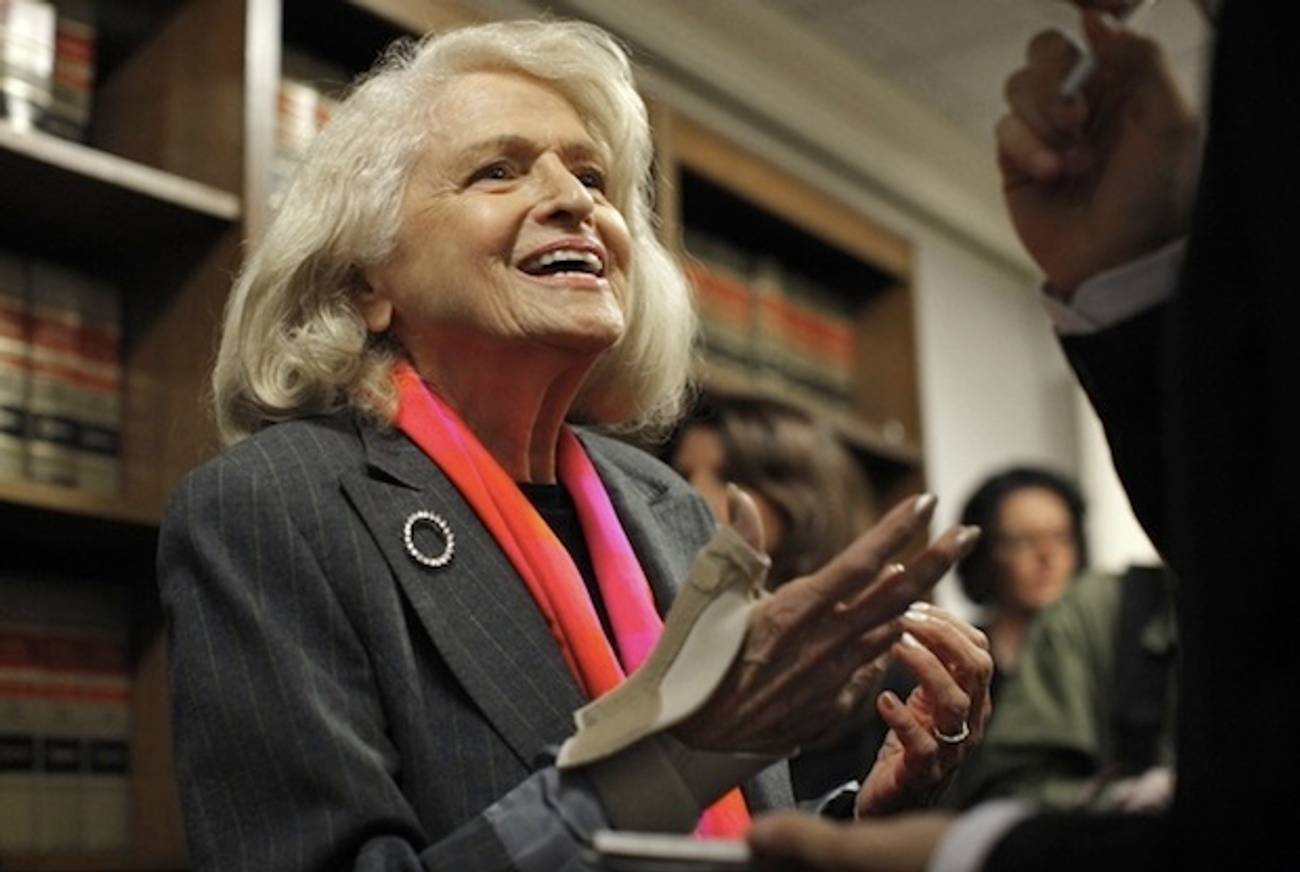The Jewish Women in the DOMA Case
A dispatch from the Supreme Court




Justice Ruth Bader Ginsburg got off the line of the morning at yesterday’s oral arguments before the Supreme Court on the constitutionality of the 1996 Defense of Marriage Act. “You’re saying, no, the state said two kinds of marriage,” Ginsburg told Paul Clement, the lawyer arguing in favor of upholding the law. “The full marriage, and then this sort of skim milk marriage.” Later, two hours into the hearing, she also had the final judicial word, on a subject she knows better than anyone else on the bench. “The history of this Court is, in the very first gender-discrimination case, Reed v. Reed” — a case Ginsburg briefed, and won — “the Court did something it had never done in the history of the country,” she reminded the packed courtroom. “The Court said, ‘This is rank discrimination.’”
It’s probably not an accident that the four Justices who were most critical of DOMA are all either women or Jews — and in the case of Ginsburg and her colleague Elena Kagan, both. It is, however, a total coincidence that the plaintiff in the case, Edith Windsor, and her lawyer, Roberta Kaplan, are also both Jewish women.
And it may make no substantive difference in the end: the vote that matters in the case belongs to Anthony Kennedy, a committed Catholic who nevertheless has written the Court’s opinions in the two major gay-rights decisions, 1996’s Romer v. Evans, which invalidated a Colorado ballot measure voiding gay-rights laws, and 2003’s Lawrence v. Texas, which struck down laws criminalizing sodomy in the 13 other states where they remained on the books. And it was Kennedy, as much as anyone else in the courtroom, who Ginsburg was addressing with her skim milk comment, after he indicated his discomfort with Clement’s argument that DOMA was somehow limited in scope and only about standardizing a single definition of marriage for administrative purposes. “It applies to over 1,100 federal laws,” Kennedy said. “Which in our society means that the federal government is intertwined with the citizens’ day-to-day life.”
The substance of the case is the $363,000 estate-tax bill Windsor received in 2009, after her wife, Thea Spyer, died following a decades-long fight with multiple sclerosis, but it could just as easily have been about a hospital refusing Windsor the right to visit Spyer, her partner for 40 years and, thanks to changes in Canadian and New York State laws, her wife for two years, or about Windsor’s access to Spyer’s Social Security benefits, or any of a myriad quotidian but incredibly important administrative rights that accrue to married couples. After the hearing, Windsor and Kaplan appeared on the steps of the Court building, across from the Capitol, in matching black suits, their caps of short blonde hair glinting in the spring sun. Kaplan’s outfit was set off by a properly juridical white silk blouse, while Windsor accessorized with a magenta scarf and the diamond brooch Spyer gave her for their engagement in 1967. The crowd outside, which had been listening to dance music and cheering as someone with a microphone announced people of interest — “Jerry Nadler!” — went wild at the sight of them. “We love you, Edie!” they shouted. Her smile, which stretched from ear to ear, said she loved them right back, and it doesn’t matter what the Court decides: being there was a victory in itself.
Earlier: Gay Marriage’s Legal Crusader [Tablet]
Transcript From Hearing on Defense of Marriage Act [NYT]
Five Justices Skeptical of Ban on Benefits to Gay Spouses [NYT]
Edith Windsor After DOMA Arguments [Politico]
Heavyweight [New Yorker]
Allison Hoffman is a senior editor at Tablet Magazine. Her Twitter feed is @allisont_dc.